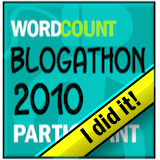Good writing uses strong verbs. Strong verbs are usually short. Thus, I strongly dislike the word "mitigate." In fact, I can't think of any time that I'd use mitigate instead of a synonym.
Some of my favorite synonyms for "mitigate" in the context of an investment or wealth management article include
* Cut
* Ease
* Reduce
Can you think of a case where it would be essential to use "mitigate" instead of a synonym? I'd like to know.
____________________
Susan B. Weiner, CFA
Check out my website at www.InvestmentWriting.com or sign up for my free monthly e-newsletter.
Copyright 2010 by Susan B. Weiner All rights reserved
Tuesday, January 12, 2010
Subscribe to:
Post Comments (Atom)



I don't like "mitigate", but I like "unmitigated". A while back, The Economist published this sentence: "Genetically modified crops are proving to be an unmitigated environmental miracle." Some words, such as mitigate, don't carry much force. But play with them (make them into an adjective, use them in their negative form) and they have far more clout.
ReplyDeleteThanks, Emma! You make an interesting point. It's funny how changing the form of the word can change its impact. Inspired by you, I'm going to use "unmitigated" when I tweet this blog post.
ReplyDeleteSome experts estimate the number of words in the English language at around 250,000 (significantly more if you count multiple senses of the same word). About 15 percent of these are verbs. So why accept your challenge and defend one verb out of nearly 40,000?
ReplyDeleteEnglish is delightfully rich in options – look no further than the ragged condition of your thesaurus for evidence. Copy writers often agonize over the choice among several words, each with its ever-so-slightly-different nuance. Readers admire authors who can turn a phrase with clarity and impact. Our clients want writing that is clear and approachable.
So, it’s easy to understand (grasp, get, see, comprehend, appreciate, admire) your quest (desire, passion, hunt) for writing that is powerful (strong, impactful).
But, Susan, as a great admirer of your blog, and your financial writing in general, I appreciate the extent of your vocabulary and your ability to use it to quickly make a point clear. Your readers like how you avoid repeating the same word over and over. We enjoy the power of your short verbs. But we also like the occasional insertion of a less powerful one because it helps mitigate the machine-gun staccato that comes from a self-limited vocabulary.
Bravo from your fans for ever-interesting and well-written topics. But keep “mitigated,” if only for rare use.
Paul Bombard
You get me thinking. (That's good!)
ReplyDeleteIn 101 online essays, I've used it twice:
http://researchpuzzle.com/blog/2009/03/18/three-types-of-risk/
http://researchpuzzle.com/blog/2009/02/09/failed-incentives/
I still like the word, but I'm sure I'll hesitate before using it again.
Paul,
ReplyDeleteThanks for making a case for mitigate. I agree that using longer words occasionally can help with rhythm. In fact, when I've taken essay writing classes, my teacher sometimes reminds me to throw in some longer sentences, too.
Tom,
Delighted to hear that my post made you think. That's exactly my aim. Thank you for taking the time to comment.
Many people don't know what "mitigate" means, as a colleague just pointed out on Twitter. Great point! I should have mentioned that.
ReplyDeleteAny mitigating circumstances for 'mitigate'? Like the suggested 'unmitigated'.
ReplyDelete'Impactful' caught my eye, or rather, caused raised eyebrows. I would tend to agree with this ABC Radio commentator: "Well, I’m always happy to cheerfully deride ugly new words that we don’t need – and the word is question here is impactful – and it’s certainly ugly, and certainly unnecessary (the two words “with impact” will do the same job). The listener says he originally heard impactful used by work colleagues in Singapore, more recently he’s heard it used by the manager of the Australian cricket team in a radio interview and by work colleagues in the United States. The word is of American origin. I found it listed in the unabridged Webster’s where it’s supported by a quote from a movie review about “some of the most impactful heroines of current films”. So this ugly and unnecessary word appears to have been coined by American journalists. And we should leave it where we found it – in the rubbish bin of American journalism."
What happened to 'with impact,', 'infuential', 'powerful', 'effective' or memorable'?
Too funny.
ReplyDeleteMorningstar is leading its site this morning with a piece on target-date funds I wrote awhile back: http://news.morningstar.com/articlenet/article.aspx?postId=2757953
I couldn't believe it when I reread it; "mitigate" is in there. I wouldn't have noticed but for our exchange above.
Tom, I'm really touched that you've taken my case against "mitigate" to heart. And congrats on your nice exposure on Morningstar!
ReplyDelete